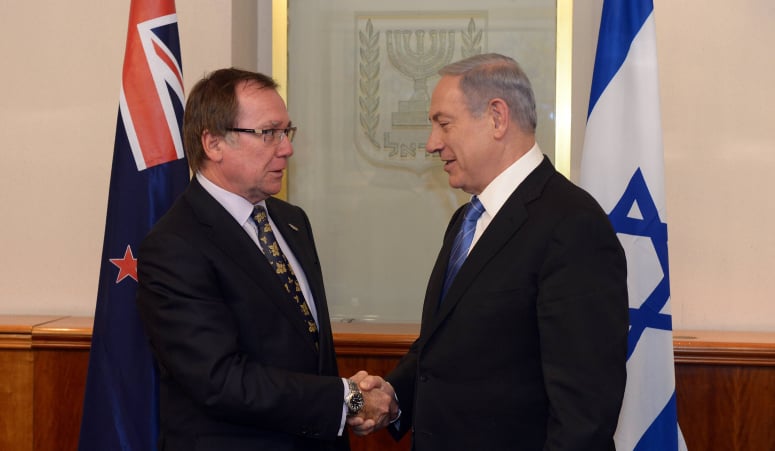Israeli Prime Minister Benjamin Netanyahu met with New Zealand Foreign Minister Murray McCully in Jerusalem on Wednesday as the Pacific island nation prepares to assume a leadership role at the United Nations Security Council in July.
Rebuffing U.S. President Barack Obama’s interview that aired Tuesday on Israel’s Channel 2, in which Obama said Iran’s stockpile of highly enriched uranium “is gone,” Netanyahu told McCully there have been reports that Iran “continues to grow its nuclear stockpile as the negotiations [with world powers] proceed.”
Last week, the International Atomic Energy Agency, the U.N.’s nuclear watchdog, said that Iran’s nuclear fuel stockpile has increased by about 20 percent over the last 18 months, despite claims by the Obama administration that the program was frozen.
Netanyahu’s meeting with McCully comes ahead of New Zealand’s scheduled appointment of an official from its country to serve a one-month term as president of the U.N. Security Council in July. New Zealand has traditionally shied away from bold moves in the international arena, but the country has signaled a willingness to wade into issues facing the chaotic Middle East region during its brief moment of international prominence this summer.
“This visit [to Israel] will ensure New Zealand is well-placed to engage on the Middle East peace process, having heard directly from the relevant parties in Israel and the occupied Palestinian territories,” McCully said last week before departing for the region, notably using the Palestinian narrative’s “occupied” descriptor for the Palestinian territories, rather than “disputed.”
While New Zealand—whose prime minister, John Key, has Jewish roots—has been an ally of Israel, the country has worked with France on drafting a U.N. Security Council resolution calling for the restarting of the Israeli-Palestinian peace process. France has signaled that it will officially recognize Palestinian statehood if the Security Council passes its resolution and the two sides fail to forge a peace treaty after 18 months.
Netanyahu said, “It’s a pleasure to have the opportunity to speak to you, not only about our bilateral relations, but our region, our quest for peace and security. That’s difficult, because we have troubling developments. There are reports now that Iran continues to grow its nuclear stockpile as the negotiations proceed. And if you add that to their continued development of ICBMs, to their vast terror network that spans five continents, the fact that they’re supporting rocket and missile attacks against us, their activities in Yemen, the fact that they violate all Security Council resolutions – that presents a serious challenge to peace and security in our place, in our region.
“You’re going to head the Security Council. I wish you a lot of luck in it. I’d say that the main thing that we have learned is that peace is achieved, as we did with Jordan and with Egypt, through direct negotiations between parties and not by fiat. It just doesn’t work that way and I hope it works, but it has to work through direct negotiations and I look forward to discussing this and many other things with you.”
By: JNS.org. With files from AP.
Do You Love Israel? Make a Donation - Show Your Support!
Donate to vital charities that help protect Israeli citizens and inspire millions around the world to support Israel too!
Now more than ever, Israel needs your help to fight and win the war -- including on the battlefield of public opinion.
Antisemitism, anti-Israel bias and boycotts are out of control. Israel's enemies are inciting terror and violence against innocent Israelis and Jews around the world. Help us fight back!

